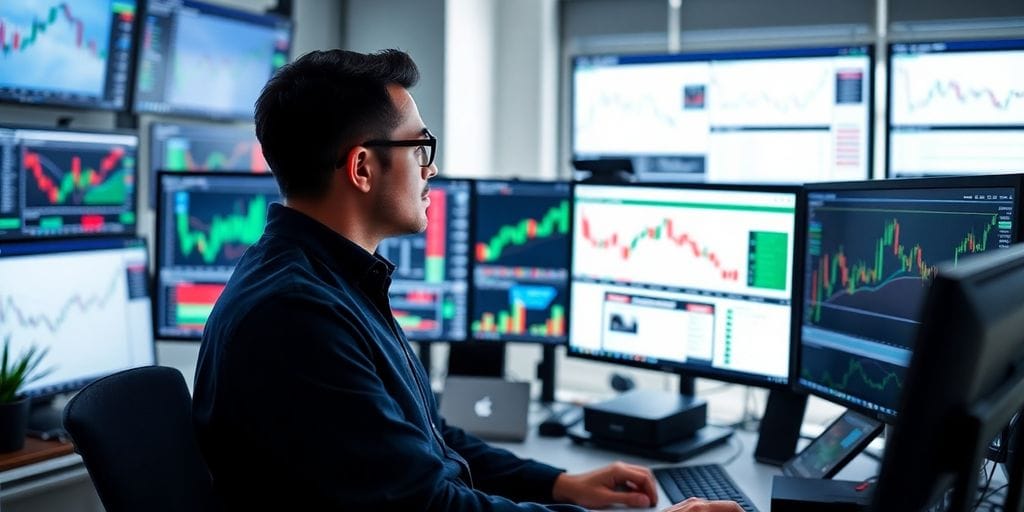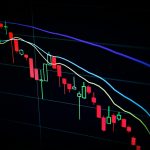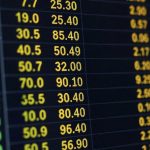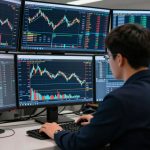Choosing the right trade future broker can make a big difference in your trading success. With so many options out there, it can feel overwhelming to decide which broker fits your needs best. You want a broker that not only offers great tools and support but also keeps your trading costs reasonable. In this article, we’ll break down the key factors to consider when selecting a futures broker, so you can make an informed choice and enhance your trading experience.
Key Takeaways
- Look for a broker with a robust trading platform that suits your style.
- Ensure the broker provides educational resources and support for all experience levels.
- Compare the commission structures and fees to find the best deal.
- Check the broker’s compliance with regulations and security measures.
- Understand the margin requirements and how they affect your trading strategy.
How to Evaluate a Futures Broker
Choosing the right futures broker is a big deal. It can really impact your trading success. There are a few things you should look at before making a decision. It’s not just about picking the first one you see; it’s about finding a good fit for your needs.
Offers Full-Featured Trading Platform
A full-featured trading platform is a must-have. Back in the day, everything was done in person, but now it’s all online. You need a platform that lets you do research, customize your trades, and keep an eye on the market. Look for fast price updates, breaking news, and all the data you need to make smart choices. It’s like having a command center for your trades. You can find a top futures broker that fits your needs.
Futures Expertise & Support
Everyone starts somewhere, and brokers should understand that. They should have plenty of educational stuff for you to check out. Articles, videos, and other training materials are great if you’re just starting out. As you get better, you’ll want more advanced stuff. Good brokers will have tutorials and webinars on complex strategies, risk management, and technical analysis. Some brokers even offer mentorship programs, which can really help you learn faster. It’s all about having the resources you need at every stage.
It’s important to find a broker that not only provides the tools but also the knowledge to use them effectively. Look for brokers who invest in educating their clients, offering resources that cater to different experience levels.
Brokerage Fees
Fee structures matter. Whether you’re doing it yourself or getting help from a broker, find a firm with clear pricing and a good reputation. The cheapest option isn’t always the best. You need to think about what you’re getting for your money, like support, access to good platforms, and the broker’s knowledge. It’s a balancing act between cost and value. Here’s a quick look at some common fees:
| Fee Type | Description |
|---|---|
| Commission Fees | Charged per trade |
| Platform Fees | Fees for using the trading platform |
| Data Fees | Fees for real-time market data |
| Inactivity Fees | Charged if you don’t trade often enough |
It’s a good idea to compare these fees across different brokers to see what works best for you.
Essential Factors When Choosing a Futures Trading Broker

There are a few things that are just common sense when it comes to doing well with futures trading, and picking the right broker is definitely one of them. You want a brokerage that gives you the right mix of tech, service, and features if you want to get the most out of your trades. If you haven’t been trading for long, or you’ve been with the same broker for ages, figuring out what makes a platform good these days can be tough. Let’s look at what you should really think about when picking a futures trading broker.
Trading Platforms
There are tons of trading platforms out there. Lots of brokers have their own software that lets people get into the futures markets. Some of the well known ones include Ninja Trader, TradeStation, and Interactive Brokers. Newer brokers are also popping up with their own platforms, or using popular charting platforms like TradingView. It’s worth noting that WeBull started offering futures in 2024 on their platform.
Instead of trying to list them all, here are some things to think about when you’re trying out a broker’s platform. And you should try it out before committing!
- Ease of Use: Is the platform easy to use and get around? This is super important, especially if you’re just starting out.
- Charting Tools: Does it have the tools you need to analyze the market? Can you customize charts the way you want?
- Order Entry: Is it easy to place orders quickly? Can you set up different order types without a headache?
Access to Specific Asset Classes
Not all brokers let you trade every single type of futures contract. Some might focus on commodities, while others are better for financial futures like currencies or interest rates. Make sure the broker you pick gives you access to the specific assets you want to trade.
Here’s a quick example:
| Asset Class | Example Contracts |
|---|---|
| Agricultural | Corn, Soybeans, Wheat |
| Energy | Crude Oil, Natural Gas |
| Financial | E-mini S&P 500, Treasury Bonds, Euro Currency |
| Metals | Gold, Silver, Copper |
Commissions and Fees
Brokers make money through commissions and fees, but they can vary a lot. Some charge a flat fee per trade, while others might have a tiered system based on volume. It’s important to understand how a broker’s fees work so you can figure out how they’ll affect your bottom line. Don’t just look at the headline number; consider all the potential fees, like inactivity fees or data fees. You want transparent pricing so you know what you’re paying for.
It’s easy to get caught up in finding the absolute lowest fees, but remember that you often get what you pay for. A broker with slightly higher fees might offer better customer service, a more stable platform, or better research tools. Think about the overall value, not just the price tag.
Read More:
Importance of Customer Support in Futures Trading
Let’s be real, futures trading can get complicated fast. When you’re dealing with fast-moving markets and leveraged positions, having solid customer support isn’t just a nice-to-have, it’s a necessity. You need to know that if something goes wrong – whether it’s a platform glitch or a question about margin requirements – you can get help quickly and efficiently.
Availability of Educational Resources
It’s great when a broker offers a ton of educational stuff. I mean, who doesn’t like free learning? Look for brokers that provide:
- Introductory courses on futures contracts.
- Explanations of different types of futures.
- Platform tutorials to get you up to speed.
These resources can really help you get a handle on the basics, especially if you’re new to futures trading. Plus, it shows the broker cares about client confidentiality and wants you to succeed.
Quality of Customer Service
Customer service quality is paramount. It’s not just about getting a quick answer; it’s about getting the right answer. Here’s what to look for:
- Knowledgeable Staff: Are they able to answer your questions about the platform, products, and trading rules?
- Language Support: Can you communicate in your preferred language?
- Account Management Support: Do they offer personalized guidance, especially for high-wealth clients?
It’s frustrating when you’re trying to sort something out and the person on the other end clearly doesn’t know what they’re talking about. You want a team that understands the ins and outs of futures trading and can provide clear, accurate information.
Response Time and Support Channels
When things go wrong, you need help now, not later. That’s why response time is so important. Also, it’s good to have options for how you get in touch. Look for brokers that offer:
- 24/7 availability, because futures markets don’t sleep.
- Multiple support channels: email, live chat, phone, etc.
- Fast response times, so you’re not left hanging when you need help most.
Having access to multiple trading platforms can be a lifesaver when you’re in a pinch.
Understanding Brokerage Fees and Commissions
It’s easy to get caught up in the excitement of futures trading, but understanding the costs is super important. Brokerage fees and commissions can eat into your profits if you’re not careful. Let’s break down what you need to know.
Types of Fees to Consider
When you’re looking at different futures brokers, it’s not just about the commission they charge per trade. There are several types of fees that can impact your bottom line. Here’s a rundown:
- Commissions: This is the fee you pay to the broker for executing a trade. Some brokers charge a flat fee, while others have variable fees based on your trading volume. Some brokers advertise “free” commissions, but make sure you understand how they make money on your trades. They might sell your order fills to third parties.
- Exchange and Regulatory Fees: These are fees that the broker passes on to you from the exchanges and regulatory bodies. They’re usually small, fixed fees per contract.
- Data and Platform Fees: To access real-time market data, Level II quotes, and advanced trading platforms, you’ll often need to pay a monthly fee. Consider if the cost is worth it, especially if you’re just starting out.
- Inactivity Fees: Some brokers charge a fee if you don’t trade frequently enough. It’s like they’re penalizing you for not generating enough commission for them.
- Hidden Fees: Always read the fine print! Some brokers have hidden fees buried in their fee schedule or terms of service. Make sure you know what you’re signing up for.
It’s easy to overlook these fees when you’re focused on potential profits, but they can add up quickly. Always do your homework and compare the fee structures of different brokers before making a decision.
Impact of Fees on Trading Performance
Fees directly affect your trading performance. The more you pay in fees, the less profit you keep. It’s that simple. Let’s look at an example:
| Fee Type | Amount per Trade | Impact on Profitability |
|---|---|---|
| Commission | $2.50 | Reduces profit by $2.50 per trade |
| Exchange Fees | $0.50 | Reduces profit by $0.50 per trade |
| Platform Fee (Monthly) | $100 | Reduces overall monthly profit, especially for low-volume traders |
As you can see, even small fees can add up over time, especially if you’re a frequent trader. It’s important to factor these costs into your trading strategy and risk management plan. Consider the total costs involved in trading.
Comparing Fee Structures Across Brokers
Comparing fee structures can be tricky because brokers often present their fees in different ways. Here are some tips for making an apples-to-apples comparison:
- Create a spreadsheet: List all the potential fees for each broker side-by-side.
- Estimate your trading volume: How many trades do you expect to make per month? Use this to calculate the total cost of commissions.
- Factor in all fees: Don’t just look at commissions. Include exchange fees, platform fees, and any other potential charges.
- Read the fine print: Make sure you understand all the terms and conditions before signing up with a broker.
Evaluating Trading Platforms for Futures Trading
Choosing the right trading platform is a big deal when you’re getting into futures. It’s not just about pretty charts; it’s about having the tools you need to make smart decisions and execute trades quickly. There are tons of platforms out there, each with its own quirks and features. Let’s break down what to look for.
User Interface and Experience
Okay, first things first: is the platform easy to use? Seriously, you don’t want to be wrestling with a clunky interface when you’re trying to make a trade. A clean, intuitive design can make all the difference, especially when markets are moving fast. I remember trying one platform where I couldn’t even find the order entry screen – total disaster! Look for something that feels natural and doesn’t require a PhD to operate. A good user interface should let you quickly access charts, place orders, and monitor your positions without any hassle. Consider these points:
- Customizable layouts: Can you arrange the windows and tools to suit your style?
- Clear data visualization: Are the charts easy to read and understand?
- Simple order entry: Can you place orders quickly and efficiently?
Mobile Trading Capabilities
In today’s world, being stuck at your desk all day isn’t always possible – or desirable. That’s where mobile trading comes in. A good mobile app lets you keep an eye on the markets and manage your trades from anywhere. But not all apps are created equal. Some are just scaled-down versions of the desktop platform, while others are designed specifically for mobile use. I’ve found that the best apps trading platform offer a good balance of features and usability. Here’s what to look for:
- Full account access: Can you do everything on the app that you can do on the desktop platform?
- Real-time data: Are you getting up-to-the-minute market information?
- Secure login: Is the app secure and protected from unauthorized access?
Integration with Analytical Tools
If you’re serious about futures trading, you’re going to need some analytical tools. Whether it’s technical indicators, charting software, or economic calendars, these tools can help you make more informed trading decisions. The best platforms integrate seamlessly with these tools, so you can easily access the information you need. Some platforms even have built-in analytical tools, which can be a big plus. For example, platforms that normalize pricing conventions across third parties offer an advantage to futures traders. Here are some things to consider:
- Charting tools: Does the platform offer a variety of charting tools and indicators?
- News feeds: Can you access real-time news and analysis from reputable sources?
- API access: Does the platform offer API access for custom development and integration?
Choosing the right platform is a personal decision. What works for one trader might not work for another. Take the time to try out a few different platforms and see which one feels the most comfortable and intuitive for you. Don’t be afraid to ask for a demo account or a free trial before committing to a platform. And remember, the best platform is the one that helps you achieve your trading goals.
Here’s a quick comparison table to illustrate the differences between platforms:
| Feature | Platform A | Platform B | Platform C |
|---|---|---|---|
| User Interface | Simple | Complex | Moderate |
| Mobile App | Excellent | Limited | Good |
| Analytical Tools | Basic | Advanced | Moderate |
| Commission Fees | High | Low | Medium |
| Customer Support | Good | Poor | Excellent |
| Order order types | Yes | Yes | Yes |
Regulatory Compliance and Security Measures
It’s easy to overlook the boring stuff when you’re excited to start trading futures, but don’t! Making sure your broker is on the up-and-up is super important. You want to know your money and trades are safe, right? Let’s break down what to look for.
Understanding Regulatory Bodies
Think of regulatory bodies as the police of the financial world. They’re there to keep things fair and prevent scams. In the US, the CFTC is a big one. Other countries have their own versions, like the FCA in the UK or ASIC in Australia. A broker being regulated means they have to follow certain rules and are being watched. It’s a good sign they’re not just going to run off with your money. Always check which regulatory bodies oversee a broker before you hand over any cash.
Importance of Security Features
Security isn’t just about regulation; it’s about how the broker protects your data and funds. Look for things like two-factor authentication (2FA), which adds an extra layer of security to your account. Also, see if they use encryption to protect your personal and financial information. A good broker will also have measures in place to prevent unauthorized access to your account. Basically, you want to make sure they’re taking security seriously. It’s worth checking up on regulatory licenses before committing.
Choosing a Broker with Strong Compliance
Compliance is more than just following the rules; it’s about a broker’s commitment to ethical behavior and transparency. A broker with strong compliance will have policies in place to prevent things like money laundering and market manipulation. They’ll also be open and honest about their fees and risks involved in trading.
Choosing a broker with strong compliance is like choosing a trustworthy partner. You want someone who’s going to look out for your best interests and play by the rules. It might take a little extra time to do your research, but it’s worth it in the long run.
Here’s a quick checklist:
- Check for regulation by a reputable body (CFTC, FCA, ASIC, etc.).
- Look for strong security features (2FA, encryption).
- Read reviews and see what other traders say about their experiences.
- Make sure they have clear and transparent policies.
Assessing Margin Requirements and Order Execution

Understanding Margin Trading
Margin in futures trading is like a good news/bad news joke. The good news is that it lets you control a large contract with a relatively small amount of capital. The bad news is that it can magnify both your profits and your losses. Think of it as a performance bond, not a down payment. Initial margin requirements usually sit somewhere between 2% and 12% of the contract’s total value, but this can change based on the specific contract, the exchange it’s traded on, and the broker’s own rules.
- Initial Margin: The amount you need to open a position.
- Maintenance Margin: The minimum you must keep in your account to hold the position. Fall below this, and you’ll get a margin call.
- Day Trade Margin: Some brokers offer reduced margin for day trades, but be careful.
Margin requirements are not static. They can change due to market volatility, so it’s important to keep a close eye on your account balance and be prepared to deposit additional funds if needed. Don’t get caught off guard by a sudden margin call.
Order Types and Execution Speed
Order execution is where the rubber meets the road. You can have the best strategy in the world, but if your orders aren’t filled quickly and accurately, it won’t matter. Here’s what to consider:
- Market Orders: Executed immediately at the best available price. Quick, but you might not get the price you want.
- Limit Orders: Executed only at your specified price or better. More control, but your order might not be filled if the market doesn’t reach your price.
- Stop Orders: Triggered when the market reaches a certain price. Used to limit losses or protect profits.
Execution speed is also important, especially in fast-moving markets. Low latency is key. A good platform should offer lifetime demo accounts to test out different order types and execution speeds.
Impact of Margin on Trading Strategy
Margin can significantly impact your trading strategy. It allows you to take on larger positions, which can lead to bigger profits, but also bigger losses. It’s a double-edged sword. Here’s how to think about it:
- Risk Tolerance: How much are you willing to lose on a single trade? Margin amplifies both gains and losses, so you need to be extra careful.
- Position Sizing: Don’t over-leverage your account. Just because you can take a large position doesn’t mean you should.
- Stop-Loss Orders: Essential for managing risk when using margin. Protect your capital by automatically exiting trades if the market moves against you. A good futures market strategy includes stop-loss orders.
| Scenario | Without Margin | With Margin (2:1) | With Margin (4:1) | With Margin (10:1) |
|---|---|---|---|---|
| Account Balance | $10,000 | $10,000 | $10,000 | $10,000 |
| Trade Size | $1,000 | $2,000 | $4,000 | $10,000 |
| Profit (1%) | $10 | $20 | $40 | $100 |
| Loss (1%) | $10 | $20 | $40 | $100 |
| Profit (5%) | $50 | $100 | $200 | $500 |
| Loss (5%) | $50 | $100 | $200 | $500 |
| Profit (10%) | $100 | $200 | $400 | $1,000 |
| Loss (10%) | $100 | $200 | $400 | $1,000 |
| Account Ruin (10%) | Never | Never | Never | Yes |
Final Thoughts on Choosing a Futures Broker
In the end, picking the right futures broker can really make or break your trading experience. It’s not just about finding the cheapest option; you need to consider what each broker brings to the table in terms of tools, support, and overall reliability. Take your time to explore different platforms, check out their features, and see how they align with your trading style and goals. Remember, a good broker can provide you with the resources and guidance you need to navigate the often unpredictable world of futures trading. So, do your homework, weigh your options, and choose wisely. Happy trading!
Frequently Asked Questions
What should I look for in a futures broker?
When choosing a futures broker, consider their trading platform, fees, customer support, and the types of assets they offer. A good broker should also have educational resources to help you learn.
How important is customer support when trading futures?
Customer support is very important. You want a broker that can help you quickly if you have questions or issues. Good support can make your trading experience much smoother.
What are brokerage fees and why do they matter?
Brokerage fees are the costs you pay to use a broker’s services. They can include commissions, account fees, and more. Understanding these fees is important because they can affect your overall profits.
What features should a trading platform have?
A good trading platform should be easy to use, offer mobile access, have strong charting tools, and allow for different types of orders. It should also provide fast and reliable order execution.
How do I know if a broker is trustworthy?
To check if a broker is trustworthy, look for their regulatory compliance, read reviews from other traders, and ensure they have good security measures in place to protect your information.
What are margin requirements in futures trading?
Margin requirements are the amount of money you need to have in your account to open a trade. Understanding these requirements is important as they can affect your trading strategy and risk.










